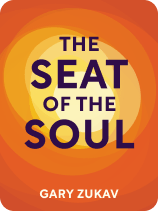

This article is an excerpt from the Shortform book guide to "The Seat of the Soul" by Gary Zukav. Shortform has the world's best summaries and analyses of books you should be reading.
Like this article? Sign up for a free trial here .
Are you looking for The Seat of the Soul quotes by Gary Zukav? What can these snippets tell us about the overall message of the book?
The Seat of the Soul is Gary Zukav’s best-selling exploration into the soul’s purpose and how to align your life with it by developing your intuition and tapping into your heart’s knowledge. We’ve collected a few quotes from the book to give you an idea of the principles that Zukav puts forth.
Keep reading for these quotes and their context.
Quotes From The Seat of the Soul
Here are a few The Seat of the Soul quotes, along with context and explanation.
“For every action there is an equal and opposite reaction. You receive from the world what you give to the world.”
An important part of the soul’s healing, Zukav says, involves balancing its karma. Karma is an impersonal law of the universe that equates to “what goes around comes around,” or, for every action there’s an equal and opposite reaction. When you act out of anger, for example, anger will come back to you. So, Zukav explains, everything that happens to you in life is related to the karma of your soul.
“When the personality comes fully to serve the energy of its soul, that is authentic empowerment.”
Once you’ve honed your intuition so that you can listen to your heart knowledge and be guided by your soul, Zukav says, you need to let go of any pursuit of external power and discover your internal power—the power of your soul. In this way you become authentically empowered to live out your soul’s purpose.
“One thing we can be certain: A person that is engaging in violence is hurting deeply because a healthy and balanced soul is incapable of harming another.”
The soul’s approach to the world is one of honoring all of life as sacred and refraining from harming any other life, but our lower selves don’t perceive the world this way. A perspective of honoring life is to see that everything has spirit and is equally divine. When we don’t honor life as divine, Zukav says, we judge some things and people as better than others, we create hierarchies, we exploit nature and other humans, and we accumulate resources, even to the detriment of others. If we revere and honor life and the natural world, he says, we’ll act within that same framework.
“Non-judgmental justice is a perception that allows you to see everything in life but does not engage your negative emotions.”
Zukav says that nothing that happens in the world is ever really “unfair”—everything is a soul experiencing what it needs to experience to balance its karmic energy. So, making value judgments, such as judging something as right or wrong or judging people as better or worse, only creates negative karma. Zukav says that we need to practice compassion and “non-judgmental acceptance” even toward those who harm us. He calls this “non-judgmental justice”—the ability to observe everything as being a product of karmic balance and not judging it.

———End of Preview———
Like what you just read? Read the rest of the world's best book summary and analysis of Gary Zukav's "The Seat of the Soul" at Shortform .
Here's what you'll find in our full The Seat of the Soul summary :
- An exploration into your soul’s purpose
- How to align your life with your soul's purpose
- How humans have become disconnected from their spiritual natures






